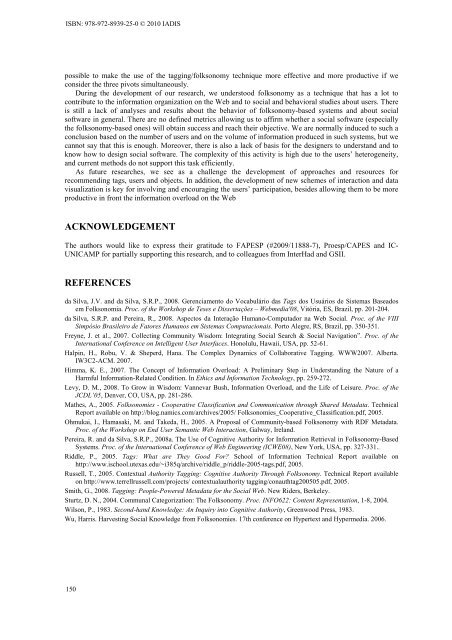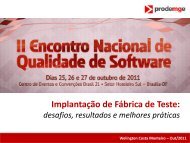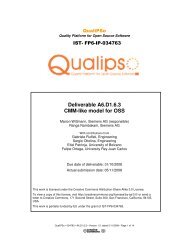- Page 2:
IADIS INTERNATIONAL CONFERENCEWWW/I
- Page 5 and 6:
Copyright 2010IADIS PressAll rights
- Page 7 and 8:
HOTLINK VISUALIZER: ADDING HOTLINKS
- Page 9 and 10:
THE ROLE OF WEB-BASED COLLABORATIVE
- Page 11 and 12:
DOCTORAL CONSORTIUMTOWARDS A DOMAIN
- Page 13 and 14:
‣ Services, Architectures and Web
- Page 15 and 16:
xiv
- Page 17 and 18:
Ciprian Dobre, University Politehni
- Page 19 and 20:
Runa Jesmin, University Of London,
- Page 22:
Full Papers
- Page 25 and 26:
ISBN: 978-972-8939-25-0 © 2010 IAD
- Page 27 and 28:
ISBN: 978-972-8939-25-0 © 2010 IAD
- Page 29 and 30:
ISBN: 978-972-8939-25-0 © 2010 IAD
- Page 31 and 32:
ISBN: 978-972-8939-25-0 © 2010 IAD
- Page 33 and 34:
ISBN: 978-972-8939-25-0 © 2010 IAD
- Page 35 and 36:
ISBN: 978-972-8939-25-0 © 2010 IAD
- Page 37 and 38:
ISBN: 978-972-8939-25-0 © 2010 IAD
- Page 39:
ISBN: 978-972-8939-25-0 © 2010 IAD
- Page 42 and 43:
IADIS International Conference WWW/
- Page 44 and 45:
IADIS International Conference WWW/
- Page 46 and 47:
IADIS International Conference WWW/
- Page 48 and 49:
IADIS International Conference WWW/
- Page 50 and 51:
IADIS International Conference WWW/
- Page 52 and 53:
IADIS International Conference WWW/
- Page 54 and 55:
IADIS International Conference WWW/
- Page 56 and 57:
IADIS International Conference WWW/
- Page 58 and 59:
IADIS International Conference WWW/
- Page 60 and 61:
IADIS International Conference WWW/
- Page 62 and 63:
IADIS International Conference WWW/
- Page 64 and 65:
IADIS International Conference WWW/
- Page 66 and 67:
IADIS International Conference WWW/
- Page 68 and 69:
IADIS International Conference WWW/
- Page 70 and 71:
IADIS International Conference WWW/
- Page 72 and 73:
IADIS International Conference WWW/
- Page 76 and 77:
IADIS International Conference WWW/
- Page 78 and 79:
IADIS International Conference WWW/
- Page 80 and 81:
IADIS International Conference WWW/
- Page 82 and 83:
IADIS International Conference WWW/
- Page 84 and 85:
IADIS International Conference WWW/
- Page 86 and 87:
IADIS International Conference WWW/
- Page 88 and 89:
IADIS International Conference WWW/
- Page 90 and 91:
IADIS International Conference WWW/
- Page 92 and 93:
IADIS International Conference WWW/
- Page 94 and 95:
IADIS International Conference WWW/
- Page 96 and 97:
IADIS International Conference WWW/
- Page 98 and 99:
IADIS International Conference WWW/
- Page 100 and 101:
IADIS International Conference WWW/
- Page 102 and 103:
IADIS International Conference WWW/
- Page 104 and 105:
IADIS International Conference WWW/
- Page 106 and 107:
IADIS International Conference WWW/
- Page 108 and 109:
IADIS International Conference WWW/
- Page 110 and 111:
IADIS International Conference WWW/
- Page 112 and 113:
IADIS International Conference WWW/
- Page 114 and 115:
IADIS International Conference WWW/
- Page 116 and 117:
IADIS International Conference WWW/
- Page 118 and 119:
IADIS International Conference WWW/
- Page 120 and 121: IADIS International Conference WWW/
- Page 122 and 123: IADIS International Conference WWW/
- Page 124 and 125: IADIS International Conference WWW/
- Page 126 and 127: IADIS International Conference WWW/
- Page 128 and 129: IADIS International Conference WWW/
- Page 130 and 131: IADIS International Conference WWW/
- Page 132 and 133: IADIS International Conference WWW/
- Page 134 and 135: IADIS International Conference WWW/
- Page 136 and 137: IADIS International Conference WWW/
- Page 138 and 139: IADIS International Conference WWW/
- Page 140: IADIS International Conference WWW/
- Page 143 and 144: ISBN: 978-972-8939-25-0 © 2010 IAD
- Page 145 and 146: ISBN: 978-972-8939-25-0 © 2010 IAD
- Page 147 and 148: ISBN: 978-972-8939-25-0 © 2010 IAD
- Page 149 and 150: ISBN: 978-972-8939-25-0 © 2010 IAD
- Page 151 and 152: ISBN: 978-972-8939-25-0 © 2010 IAD
- Page 153 and 154: ISBN: 978-972-8939-25-0 © 2010 IAD
- Page 155 and 156: ISBN: 978-972-8939-25-0 © 2010 IAD
- Page 157 and 158: ISBN: 978-972-8939-25-0 © 2010 IAD
- Page 159 and 160: ISBN: 978-972-8939-25-0 © 2010 IAD
- Page 161 and 162: ISBN: 978-972-8939-25-0 © 2010 IAD
- Page 163 and 164: ISBN: 978-972-8939-25-0 © 2010 IAD
- Page 165 and 166: ISBN: 978-972-8939-25-0 © 2010 IAD
- Page 167 and 168: ISBN: 978-972-8939-25-0 © 2010 IAD
- Page 169: ISBN: 978-972-8939-25-0 © 2010 IAD
- Page 173 and 174: ISBN: 978-972-8939-25-0 © 2010 IAD
- Page 175 and 176: ISBN: 978-972-8939-25-0 © 2010 IAD
- Page 177 and 178: ISBN: 978-972-8939-25-0 © 2010 IAD
- Page 179 and 180: ISBN: 978-972-8939-25-0 © 2010 IAD
- Page 181 and 182: ISBN: 978-972-8939-25-0 © 2010 IAD
- Page 183 and 184: ISBN: 978-972-8939-25-0 © 2010 IAD
- Page 185 and 186: ISBN: 978-972-8939-25-0 © 2010 IAD
- Page 187 and 188: ISBN: 978-972-8939-25-0 © 2010 IAD
- Page 189 and 190: ISBN: 978-972-8939-25-0 © 2010 IAD
- Page 191 and 192: ISBN: 978-972-8939-25-0 © 2010 IAD
- Page 193 and 194: ISBN: 978-972-8939-25-0 © 2010 IAD
- Page 195 and 196: ISBN: 978-972-8939-25-0 © 2010 IAD
- Page 197 and 198: ISBN: 978-972-8939-25-0 © 2010 IAD
- Page 199 and 200: ISBN: 978-972-8939-25-0 © 2010 IAD
- Page 201 and 202: ISBN: 978-972-8939-25-0 © 2010 IAD
- Page 203 and 204: ISBN: 978-972-8939-25-0 © 2010 IAD
- Page 205 and 206: ISBN: 978-972-8939-25-0 © 2010 IAD
- Page 207 and 208: ISBN: 978-972-8939-25-0 © 2010 IAD
- Page 209 and 210: ISBN: 978-972-8939-25-0 © 2010 IAD
- Page 211 and 212: ISBN: 978-972-8939-25-0 © 2010 IAD
- Page 213 and 214: ISBN: 978-972-8939-25-0 © 2010 IAD
- Page 215 and 216: ISBN: 978-972-8939-25-0 © 2010 IAD
- Page 217 and 218: ISBN: 978-972-8939-25-0 © 2010 IAD
- Page 219 and 220: ISBN: 978-972-8939-25-0 © 2010 IAD
- Page 221 and 222:
ISBN: 978-972-8939-25-0 © 2010 IAD
- Page 223 and 224:
ISBN: 978-972-8939-25-0 © 2010 IAD
- Page 225 and 226:
ISBN: 978-972-8939-25-0 © 2010 IAD
- Page 227 and 228:
ISBN: 978-972-8939-25-0 © 2010 IAD
- Page 229 and 230:
ISBN: 978-972-8939-25-0 © 2010 IAD
- Page 231 and 232:
ISBN: 978-972-8939-25-0 © 2010 IAD
- Page 233 and 234:
ISBN: 978-972-8939-25-0 © 2010 IAD
- Page 235 and 236:
ISBN: 978-972-8939-25-0 © 2010 IAD
- Page 237 and 238:
ISBN: 978-972-8939-25-0 © 2010 IAD
- Page 239 and 240:
ISBN: 978-972-8939-25-0 © 2010 IAD
- Page 241 and 242:
ISBN: 978-972-8939-25-0 © 2010 IAD
- Page 243 and 244:
ISBN: 978-972-8939-25-0 © 2010 IAD
- Page 245 and 246:
ISBN: 978-972-8939-25-0 © 2010 IAD
- Page 247 and 248:
ISBN: 978-972-8939-25-0 © 2010 IAD
- Page 249 and 250:
ISBN: 978-972-8939-25-0 © 2010 IAD
- Page 251 and 252:
ISBN: 978-972-8939-25-0 © 2010 IAD
- Page 253 and 254:
ISBN: 978-972-8939-25-0 © 2010 IAD
- Page 255 and 256:
ISBN: 978-972-8939-25-0 © 2010 IAD
- Page 257 and 258:
ISBN: 978-972-8939-25-0 © 2010 IAD
- Page 259 and 260:
ISBN: 978-972-8939-25-0 © 2010 IAD
- Page 261 and 262:
ISBN: 978-972-8939-25-0 © 2010 IAD
- Page 263 and 264:
ISBN: 978-972-8939-25-0 © 2010 IAD
- Page 265 and 266:
ISBN: 978-972-8939-25-0 © 2010 IAD
- Page 267 and 268:
ISBN: 978-972-8939-25-0 © 2010 IAD
- Page 269 and 270:
ISBN: 978-972-8939-25-0 © 2010 IAD
- Page 271 and 272:
ISBN: 978-972-8939-25-0 © 2010 IAD
- Page 273 and 274:
ISBN: 978-972-8939-25-0 © 2010 IAD
- Page 276:
Short Papers
- Page 279 and 280:
ISBN: 978-972-8939-25-0 © 2010 IAD
- Page 281 and 282:
ISBN: 978-972-8939-25-0 © 2010 IAD
- Page 283 and 284:
ISBN: 978-972-8939-25-0 © 2010 IAD
- Page 285 and 286:
ISBN: 978-972-8939-25-0 © 2010 IAD
- Page 287 and 288:
ISBN: 978-972-8939-25-0 © 2010 IAD
- Page 289 and 290:
ISBN: 978-972-8939-25-0 © 2010 IAD
- Page 291 and 292:
ISBN: 978-972-8939-25-0 © 2010 IAD
- Page 293 and 294:
ISBN: 978-972-8939-25-0 © 2010 IAD
- Page 295 and 296:
ISBN: 978-972-8939-25-0 © 2010 IAD
- Page 297 and 298:
ISBN: 978-972-8939-25-0 © 2010 IAD
- Page 299 and 300:
ISBN: 978-972-8939-25-0 © 2010 IAD
- Page 301 and 302:
ISBN: 978-972-8939-25-0 © 2010 IAD
- Page 303 and 304:
ISBN: 978-972-8939-25-0 © 2010 IAD
- Page 305 and 306:
ISBN: 978-972-8939-25-0 © 2010 IAD
- Page 307 and 308:
ISBN: 978-972-8939-25-0 © 2010 IAD
- Page 309 and 310:
ISBN: 978-972-8939-25-0 © 2010 IAD
- Page 311 and 312:
ISBN: 978-972-8939-25-0 © 2010 IAD
- Page 313 and 314:
ISBN: 978-972-8939-25-0 © 2010 IAD
- Page 315 and 316:
ISBN: 978-972-8939-25-0 © 2010 IAD
- Page 317 and 318:
ISBN: 978-972-8939-25-0 © 2010 IAD
- Page 319 and 320:
ISBN: 978-972-8939-25-0 © 2010 IAD
- Page 321 and 322:
ISBN: 978-972-8939-25-0 © 2010 IAD
- Page 323 and 324:
ISBN: 978-972-8939-25-0 © 2010 IAD
- Page 325 and 326:
ISBN: 978-972-8939-25-0 © 2010 IAD
- Page 327 and 328:
ISBN: 978-972-8939-25-0 © 2010 IAD
- Page 329 and 330:
ISBN: 978-972-8939-25-0 © 2010 IAD
- Page 331 and 332:
ISBN: 978-972-8939-25-0 © 2010 IAD
- Page 333 and 334:
ISBN: 978-972-8939-25-0 © 2010 IAD
- Page 335 and 336:
ISBN: 978-972-8939-25-0 © 2010 IAD
- Page 337 and 338:
ISBN: 978-972-8939-25-0 © 2010 IAD
- Page 339 and 340:
ISBN: 978-972-8939-25-0 © 2010 IAD
- Page 341 and 342:
ISBN: 978-972-8939-25-0 © 2010 IAD
- Page 343 and 344:
ISBN: 978-972-8939-25-0 © 2010 IAD
- Page 345 and 346:
ISBN: 978-972-8939-25-0 © 2010 IAD
- Page 347 and 348:
ISBN: 978-972-8939-25-0 © 2010 IAD
- Page 349 and 350:
ISBN: 978-972-8939-25-0 © 2010 IAD
- Page 351 and 352:
ISBN: 978-972-8939-25-0 © 2010 IAD
- Page 353 and 354:
ISBN: 978-972-8939-25-0 © 2010 IAD
- Page 355 and 356:
ISBN: 978-972-8939-25-0 © 2010 IAD
- Page 357 and 358:
ISBN: 978-972-8939-25-0 © 2010 IAD
- Page 359 and 360:
ISBN: 978-972-8939-25-0 © 2010 IAD
- Page 361 and 362:
ISBN: 978-972-8939-25-0 © 2010 IAD
- Page 363 and 364:
ISBN: 978-972-8939-25-0 © 2010 IAD
- Page 365 and 366:
ISBN: 978-972-8939-25-0 © 2010 IAD
- Page 367 and 368:
ISBN: 978-972-8939-25-0 © 2010 IAD
- Page 369 and 370:
ISBN: 978-972-8939-25-0 © 2010 IAD
- Page 371 and 372:
ISBN: 978-972-8939-25-0 © 2010 IAD
- Page 373 and 374:
ISBN: 978-972-8939-25-0 © 2010 IAD
- Page 375 and 376:
ISBN: 978-972-8939-25-0 © 2010 IAD
- Page 377 and 378:
ISBN: 978-972-8939-25-0 © 2010 IAD
- Page 379 and 380:
ISBN: 978-972-8939-25-0 © 2010 IAD
- Page 381 and 382:
ISBN: 978-972-8939-25-0 © 2010 IAD
- Page 383 and 384:
ISBN: 978-972-8939-25-0 © 2010 IAD
- Page 385 and 386:
ISBN: 978-972-8939-25-0 © 2010 IAD
- Page 387 and 388:
ISBN: 978-972-8939-25-0 © 2010 IAD
- Page 390 and 391:
IADIS International Conference WWW/
- Page 392 and 393:
IADIS International Conference WWW/
- Page 394 and 395:
IADIS International Conference WWW/
- Page 396 and 397:
IADIS International Conference WWW/
- Page 398 and 399:
IADIS International Conference WWW/
- Page 400 and 401:
IADIS International Conference WWW/
- Page 402 and 403:
IADIS International Conference WWW/
- Page 404 and 405:
IADIS International Conference WWW/
- Page 406 and 407:
IADIS International Conference WWW/
- Page 408 and 409:
IADIS International Conference WWW/
- Page 410 and 411:
IADIS International Conference WWW/
- Page 412:
Posters
- Page 415 and 416:
ISBN: 978-972-8939-25-0 © 2010 IAD
- Page 417 and 418:
ISBN: 978-972-8939-25-0 © 2010 IAD
- Page 419 and 420:
ISBN: 978-972-8939-25-0 © 2010 IAD
- Page 421 and 422:
ISBN: 978-972-8939-25-0 © 2010 IAD
- Page 423 and 424:
ISBN: 978-972-8939-25-0 © 2010 IAD
- Page 425 and 426:
ISBN: 978-972-8939-25-0 © 2010 IAD
- Page 427 and 428:
ISBN: 978-972-8939-25-0 © 2010 IAD
- Page 429 and 430:
ISBN: 978-972-8939-25-0 © 2010 IAD
- Page 431 and 432:
ISBN: 978-972-8939-25-0 © 2010 IAD
- Page 433 and 434:
ISBN: 978-972-8939-25-0 © 2010 IAD
- Page 435 and 436:
ISBN: 978-972-8939-25-0 © 2010 IAD
- Page 437 and 438:
ISBN: 978-972-8939-25-0 © 2010 IAD
- Page 439 and 440:
ISBN: 978-972-8939-25-0 © 2010 IAD
- Page 442 and 443:
IADIS International Conference WWW/
- Page 444 and 445:
IADIS International Conference WWW/
- Page 446 and 447:
IADIS International Conference WWW/
- Page 448 and 449:
IADIS International Conference WWW/
- Page 450 and 451:
IADIS International Conference WWW/
- Page 452:
IADIS International Conference WWW/
- Page 455 and 456:
Jang, C. ..........................




